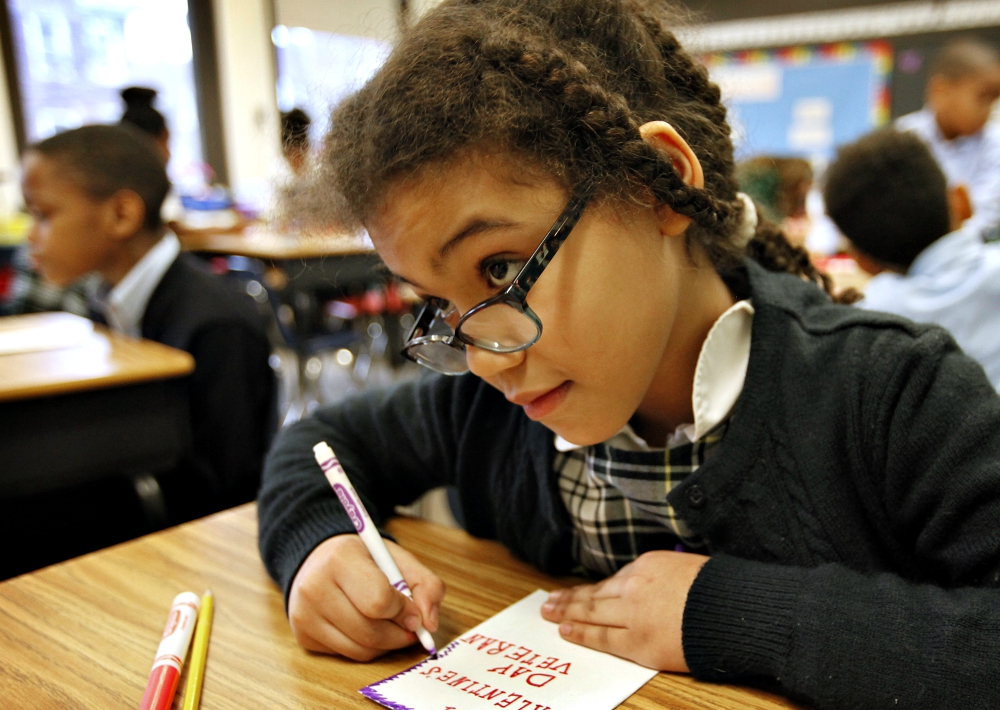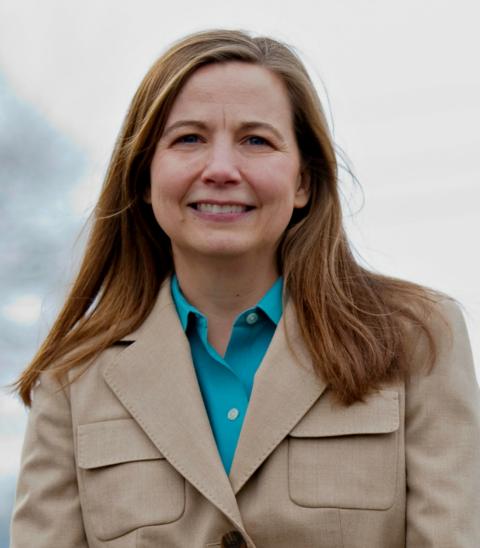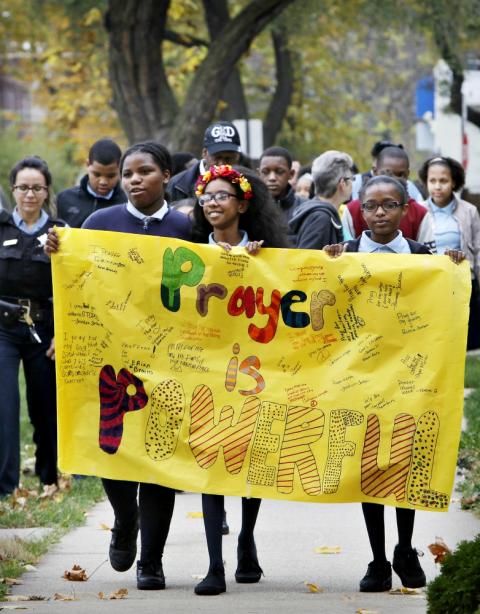
Third-grade student Elaine Chatman-Borowiec makes a valentine to send to a veteran as part of a Catholic Schools Week activity at St. Thomas the Apostle School in Chicago Feb. 2, 2016. (CNS/Catholic New World/Karen Callaway)
At a time when Republicans in Congress are demanding cuts to Medicaid and the president is taking draconian measures against immigrants and refugees, the Illinois legislature and Gov. Bruce Rauner delivered some good news to the poor this week, passing an education-funding measure that will provide additional monies for both public and private schools in Illinois. This includes the Catholic schools throughout the state.
The legislation establishes tax credits for those who donate to a scholarship fund for private schools. The taxpayer receives a 75 percent credit against the amount of their donation. So, the dioceses of Illinois will still need to raise money for scholarships, but it will be easier to do so, on account of the tax benefit. This system is different from vouchers, which provide direct government aid to the families attending private schools.
The scholarships are not available to affluent families. Students whose families earn 300 percent of the federal poverty level or less ($73,800 for a family of four) will qualify for a scholarship. Additionally, the program gives priority to poor students: in the first four months of each year, specifically:
- To students who are members of a household whose previous year's total annual income does not exceed 185 percent of the federal poverty level ($45,510 for a family of four);
- To students who reside in a "focus district" (a school district that does not meet certain benchmarks);
- To siblings of those already receiving scholarships.
Students identified as English-language learners, gifted students, and special education students receive slightly larger scholarships.

Nicole Garnett (University of Notre Dame)
"This is the largest parental choice program ever enacted by a state legislature under Democratic control," said Nicole Garnett, who works with the University of Notre Dame's Alliance for Catholic Education program. "Reasonable people have assumed for years that this could never happen in Illinois. The fact lawmakers in Illinois — a state that has been trapped in gridlock for so long — were able to reach this compromise, which benefits children in public schools as well as parents who want alternatives for their children, is a great sign of hope for disadvantaged kids."
Garnett, a professor at Notre Dame Law School, literally wrote the book on the spillover effects of Catholic schools: Lost Classroom, Lost Community: Catholic Schools' Importance in Urban America, which she co-authored with Margaret Brinig. The book looks at the ways social capital evaporated in neighborhoods where Catholic schools had closed and I reviewed it here.
"My research on Chicago neighborhoods suggests that Catholic schools are more than a lifeline for disadvantaged children, although they are certainly that," she told me this week after the new law passed. "They also generate social cohesion, stabilize communities and even suppress serious crime. The program enacted in Illinois is not just good education policy, it also will serve an important community development function."
While the program will benefit schools throughout the state, the assistance to Chicago is especially important. The violence that plagues the Windy City is notorious. Poverty in some neighborhoods is endemic. For the families in those neighborhoods, many of them not Catholic, entrance into the local Catholic school may be their best shot out of poverty.

Escorted by Chicago police, students from the Academy of St. Benedict the African School in Chicago conduct a prayer walk for peace in their community in 2015. (CNS/Catholic New World/Karen Callaway)
I do not pass judgment on the public schools: Teachers today are expected to deal with problems that teachers 40 years ago could not have even imagined. I rejoice that this bill also provided additional funding for the public schools. But when a neighborhood is in triage, you look for whatever lifesaving means are at hand and the local Catholic school is a principal field hospital in many of Chicago's roughest neighborhoods.
And where children are involved, we all must move past the paradigm that sees Catholic schools in competition with public schools: Competition presumes a winner and a loser and we can never think of a child as becoming a loser. It is time that private and public educators seek out ways to collaborate, learning from each other, dividing tasks according to demonstrated success and competence, building each other up, not tearing each other down.
The school funding bill was only one measure that passed the Illinois legislature and was signed by the governor this week. After years of dysfunction in Springfield, concord blossomed this past week. Also passed into law was a bill that would protect undocumented workers from being arrested simply because of their deportation status, unless there is a warrant from a judge for the person's arrest — making Illinois a kind of "sanctuary state." Rauner, a Republican, gets credit for standing up to the current anti-immigrant fervor in his party.
An automatic voter registration law also passed the legislature and was signed by the governor. Making it more difficult for people to vote has been one of the principal objectives of the Koch brothers and their American Legislative Exchange Council, so Rauner also gets credit for standing up to that anti-democratic agenda.
Advertisement
But something else happened in Illinois. On the immigration issue, the Illinois Business Council worked with organized labor and church leaders to support the immigration bill. On the education-funding bill, Rauner and Chicago Mayor Rahm Emanuel had to find a way to work together, something that has not come naturally to them.
It goes without saying that three years of civic engagement by Cardinal Blase Cupich played a critical role in the passage of the education-funding measure. Legislators had to compromise. Everyone had to put the common good ahead of ideological purity or partisan advantage.
As I discussed last week, Catholicism implies a kind of politics, not of left vs. right, but of the common good over special interests and ideologies; of special concern for the poor, not the base; of a focus on the human dignity of each and all, not the exploitation of the powerless by the powerful.
The eschaton did not dawn in Illinois this week, but the political landscape changed, and it changed in a way that is more in line with what we Catholics mean when we say "good governance."
[Michael Sean Winters covers the nexus of religion and politics for NCR.]
Editor's note: Don't miss out on Michael Sean Winters' latest! Sign up to receive free newsletters, and we will notify you when he publishes new Distinctly Catholic columns.








